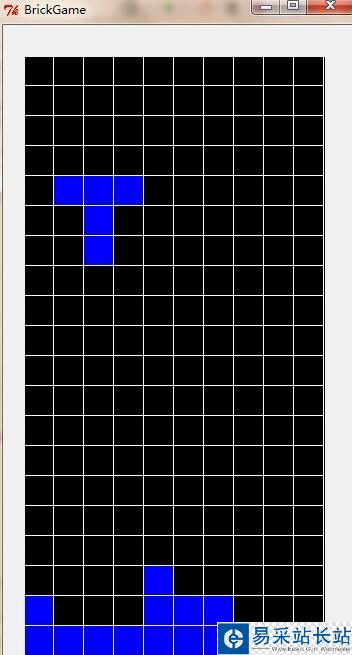在公司实习。公司推崇Python和Django框架,所以也得跟着学点。
简单瞅了下Tkinter,和Canvas配合在一起,还算是简洁的界面开发API。threading.Thread创建新的线程,其多线程机制也算是方便。
只是canvas.create_rectangle居然不是绘制矩形,而是新建了矩形控件这点让人大跌眼镜。先开始,在线程里每次都重绘多个矩形(随数组变化),其实是每次都新建了N个矩形,结果内存暴增。原来,对矩形进行变更时,只需用canvas.itemconfig即可。
下面就是截图(时间太晚,明日还得上班,做得非常粗糙...没事时再慢慢修正)。

而代码如下:
#coding=utf-8 from Tkinter import *; from random import *; import thread; from tkMessageBox import showinfo; import threading; from time import sleep; class BrickGame(object): #是否开始 start = True; #是否到达底部 isDown = True; #窗体 window = None; #frame frame1 = None; #绘图类 canvas = None; #标题 title = "BrickGame"; #宽和高 width = 350; height = 670; #行和列 rows = 20; cols = 10; #几种方块 brick = [ [ [ [1,1,1], [0,0,1], [0,0,0] ], [ [0,0,1], [0,0,1], [0,1,1] ], [ [0,0,0], [1,0,0], [1,1,1] ], [ [1,1,0], [1,0,0], [1,0,0] ] ], [ [ [0,0,0], [0,1,1], [0,1,1] ], [ [0,0,0], [0,1,1], [0,1,1] ], [ [0,0,0], [0,1,1], [0,1,1] ], [ [0,0,0], [0,1,1], [0,1,1] ] ], [ [ [1,1,1], [0,1,0], [0,1,0] ], [ [0,0,1], [1,1,1], [0,0,1] ], [ [0,1,0], [0,1,0], [1,1,1] ], [ [1,0,0], [1,1,1], [1,0,0] ] ], [ [ [0,1,0], [0,1,0], [0,1,0] ], [ [0,0,0], [1,1,1], [0,0,0] ], [ [0,1,0], [0,1,0], [0,1,0] ], [ [0,0,0], [1,1,1], [0,0,0] ] ] ]; #当前的方块 curBrick = None; #当前方块数组 arr = None; #当前方块形状 shape = -1; #当前方块的行和列(最左上角) curRow = -10; curCol = -10; #背景 back = list(); #格子 gridBack = list(); #初始化 def init(self): for i in range(0,self.rows): self.back.insert(i,list()); self.gridBack.insert(i,list()); for i in range(0,self.rows): for j in range(0,self.cols): self.back[i].insert(j,0); self.gridBack[i].insert(j,self.canvas.create_rectangle(30*j,30*i,30*(j+1),30*(i+1),fill="black")); #绘制游戏的格子 def drawRect(self): for i in range(0,self.rows): for j in range(0,self.cols): if self.back[i][j]==1: self.canvas.itemconfig(self.gridBack[i][j],fill="blue",outline="white"); elif self.back[i][j]==0: self.canvas.itemconfig(self.gridBack[i][j],fill="black",outline="white"); #绘制当前正在运动的方块 if self.curRow!=-10 and self.curCol!=-10: for i in range(0,len(self.arr)): for j in range(0,len(self.arr[i])): if self.arr[i][j]==1: self.canvas.itemconfig(self.gridBack[self.curRow+i][self.curCol+j],fill="blue",outline="white"); #判断方块是否已经运动到达底部 if self.isDown: for i in range(0,3): for j in range(0,3): if self.arr[i][j]!=0: self.back[self.curRow+i][self.curCol+j] = self.arr[i][j]; #判断整行消除 self.removeRow(); #获得下一个方块 self.getCurBrick(); #判断是否有整行需要消除 def removeRow(self): for i in range(0,self.rows): tag1 = True; for j in range(0,self.cols): if self.back[i][j]==0: tag1 = False; break; if tag1==True: #从上向下挪动 for m in xrange(i-1,0,-1): for n in range(0,self.cols): self.back[m+1][n] = self.back[m][n]; #获得当前的方块 def getCurBrick(self): self.curBrick = randint(0,len(self.brick)-1); self.shape = 0; #当前方块数组 self.arr = self.brick[self.curBrick][self.shape]; self.curRow = 0; self.curCol = 1; #是否到底部为False self.isDown = False; #监听键盘输入 def onKeyboardEvent(self,event): #未开始,不必监听键盘输入 if self.start == False: return; #记录原来的值 tempCurCol = self.curCol; tempCurRow = self.curRow; tempShape = self.shape; tempArr = self.arr; direction = -1; if event.keycode==37: #左移 self.curCol-=1; direction = 1; elif event.keycode==38: #变化方块的形状 self.shape+=1; direction = 2; if self.shape>=4: self.shape=0; self.arr = self.brick[self.curBrick][self.shape]; elif event.keycode==39: direction = 3; #右移 self.curCol+=1; elif event.keycode==40: direction = 4; #下移 self.curRow+=1; if self.isEdge(direction)==False: self.curCol = tempCurCol; self.curRow = tempCurRow; self.shape = tempShape; self.arr = tempArr; self.drawRect(); return True; #判断当前方块是否到达边界 def isEdge(self,direction): tag = True; #向左,判断边界 if direction==1: for i in range(0,3): for j in range(0,3): if self.arr[j][i]!=0 and (self.curCol+i<0 or self.back[self.curRow+j][self.curCol+i]!=0): tag = False; break; #向右,判断边界 elif direction==3: for i in range(0,3): for j in range(0,3): if self.arr[j][i]!=0 and (self.curCol+i>=self.cols or self.back[self.curRow+j][self.curCol+i]!=0): tag = False; break; #向下,判断底部 elif direction==4: for i in range(0,3): for j in range(0,3): if self.arr[i][j]!=0 and (self.curRow+i>=self.rows or self.back[self.curRow+i][self.curCol+j]!=0): tag = False; self.isDown = True; break; #进行变形,判断边界 elif direction==2: if self.curCol<0: self.curCol=0; if self.curCol+2>=self.cols: self.curCol = self.cols-3; if self.curRow+2>=self.rows: self.curRow = self.curRow-3; return tag; #方块向下移动 def brickDown(self): while True: if self.start==False: print("exit thread"); break; tempRow = self.curRow; self.curRow+=1; if self.isEdge(4)==False: self.curRow = tempRow; self.drawRect(); #每一秒下降一格 sleep(1); #运行 def __init__(self): self.window = Tk(); self.window.title(self.title); self.window.minsize(self.width,self.height); self.window.maxsize(self.width,self.height); self.frame1 = Frame(self.window,width=300,height=600,bg="black"); self.frame1.place(x=20,y=30); self.canvas = Canvas(self.frame1,width=300,height=600,bg="black"); self.init(); #获得当前的方块 self.getCurBrick(); #按照数组,绘制格子 self.drawRect(); self.canvas.pack(); #监听键盘事件 self.window.bind("<KeyPress>",self.onKeyboardEvent); #启动方块下落线程 downThread = threading.Thread(target=self.brickDown,args=()); downThread.start(); self.window.mainloop(); self.start=False; pass; if __name__=='__main__': brickGame = BrickGame();
新闻热点
疑难解答